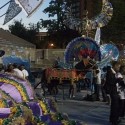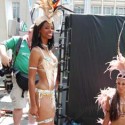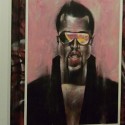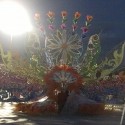Sway interviews Ward 2 City Councilor Candidate Cadigia Ali
By Samuel Getachew
Cadigia Ali is a dream candidate for any elected office in Canada. The Somali born medical doctor who is super passionate about her city and country has run twice, once with the then-city councillor and now mayor Rob Ford in 2006, and his brother and now current councillor, Doug Ford.
Both times, she came up short and ultimately lost both elections, yet that is not stopping her from aiming to try once again. In a city that is comprised of 49.5% visible minorities and whose local government is only comprised of 14 % visible minorities according to research done by diversecitytoronto.ca, the persistence of candidates such as Ms Ali is important to the foundation of the kind of city we want to create in a very multicultural city like Toronto.
Sway caught up with the inspiring Cadigia Ali as she prepares to host a fundraiser to pay her campaign debts with the help of community leader extraordinaire John Tory and the Maytree Foundation.
Congratulations on being a candidate in the just concluded municipal election. Looking back on your experience, what were some of the highlights and challenges you encountered as a candidate?
First of all, I would like to thank Sway for giving me this opportunity. Let me reflect on my most recent municipal election experience, in which I run as a candidate for City Councilor in Ward 2, North Etobicoke.
From the outset, I have to admit that meeting and talking with people and being welcomed in their homes and on their doorsteps was the most gratifying, rewarding and a humbling experience I have ever had. Being a people’s person, talking to people from my neighbourhood about our common problems and common good, and laying down my political platform and solutions; being challenged and clarifying my position in plain words were the most valuable experience.
Though this may seem an ordinary thing in all campaigns, to me this was the most important highlight of my campaign. Asking people for their votes and financial help for your candidacy so that you can work on common goal later on, believe me, is a very humbling and humanizing experience and I enjoyed it a great deal. That is why I consider myself blessed and honoured to have such an opportunity.
The challenges are many, especially for a person like me who ran against an incumbent or establishment if you will, like the Fords. The Fords, both of them, carry the name recognition, the organizational network and the finances required to run a complex campaign. Unfortunately, the painful and upsetting thing for many of us to admit, is that in our consumerist societies, even our democratic process is becoming less of a people’s choice and more about having the money to buy the organizational network and the advertisements you need.
The second challenge is that the Ward 2s’ unemployment rate is as high as 8.3 per cent, almost a point higher than the city average. Therefore the need for public intervention – the government neglect is enormous – is critical, especially with respect to those who live in public housing enclaves. The latter group who work very hard to meet their basic needs feel deeply alienated and abandoned by the system; as such they hardly see the necessity to come out and vote. It requires a considerable investment in time and money to empower these people and change their attitudes.
You were a candidate in 2006 as well as 2010. Would you say, the experience is as just the same or are our political process becoming more open and accessible to the idea of diversity?
In a civic or federal election, there are always similarities and trends that one can detect. I believe that every election has its own peculiarity. On that front, between the two civic elections of 2006 and 2010, there were some similarities and differences. On the similarity front, as I mentioned before in your first question, the establishment element and the weight and influence it carries were always the same. Therefore, name recognition, money and network have played a role and had the same effect in both elections. But more than that the difference between the two elections (2006 & 2010) is the decisive impact that the Mayoral election, Robert Ford’s populism and the political momentum, city-wide, helped also his brother Doug Ford to win in Ward 2.
On the diversity file, I’m very pragmatic and optimistic about the world we live in. It is not an ideal world, but realistically, enormous progress has been made and we know that behaviour modification takes some time. I’m conscious about the dual-minority challenges of being not only a woman, but also a woman of colour. I can assure you that from my experience in the campaign trail, immense progress has been made in our human relations. I was enthusiastically welcomed by the majority of the people I met, yet there was always a fringe of people I encountered who were awkward and not ready to vote for me, including people from diverse communities.
How important is mentorship, such as the one given by the Maytree Foundation, to the personal and professional growth of a candidate.
I had the privilege to be trained as a candidate by the Maytree Foundation School of Civics and I am grateful for their valuable help. No doubt, Maytree Foundation’s training had an immense impact on my personal growth and motivation as candidate. Because it is through their training that I and others gained the knowledge, skills and the mentorship we needed to participate in this complex political process.
During the training, they skilfully illustrated the existing barriers newcomers from diverse cultural communities commonly face, and also taught us also some practical information such as networks we need to build. Other important things I learned in the Maytree Foundation School of Civics are the tactical campaign knowledge that I needed to know as candidate . Usually, this knowledge is acquired through years of volunteering and working with other candidates.
Leading Toronto community builder John Tory is helping organize a fund-raising for emerging candidates from culturally diverse communities. How important is money to a successful political effort?- Tell us about the fund-raiser that is coming up?
Mr. John Tory’s initiative to help new diverse emerging leaders to erase their campaign deficit is an extraordinary effort to be commended. I would like to thank John Tory for this remarkable help, as he understands that lack of campaign funds is unfortunately becoming an immense barrier to run for an election and win. It discourages talented people from getting involved in the political process and as a result, change will seem impossible when it comes to the kinds of leaders we will have for the many years to come. Imbalance in campaign funds can also create a democratic deficit and ultimately hinder the political system from changing and expanding. I really don’t know how to express my immense gratitude to Maytree Foundation and John Tory once again other than saying THANK YOU!
I would love to leave your readers the following African proverbs translated in to English: No sun sets without its histories. (Zulu) It’s always good to save or invest for the future. (Swahili)








Leave your response!